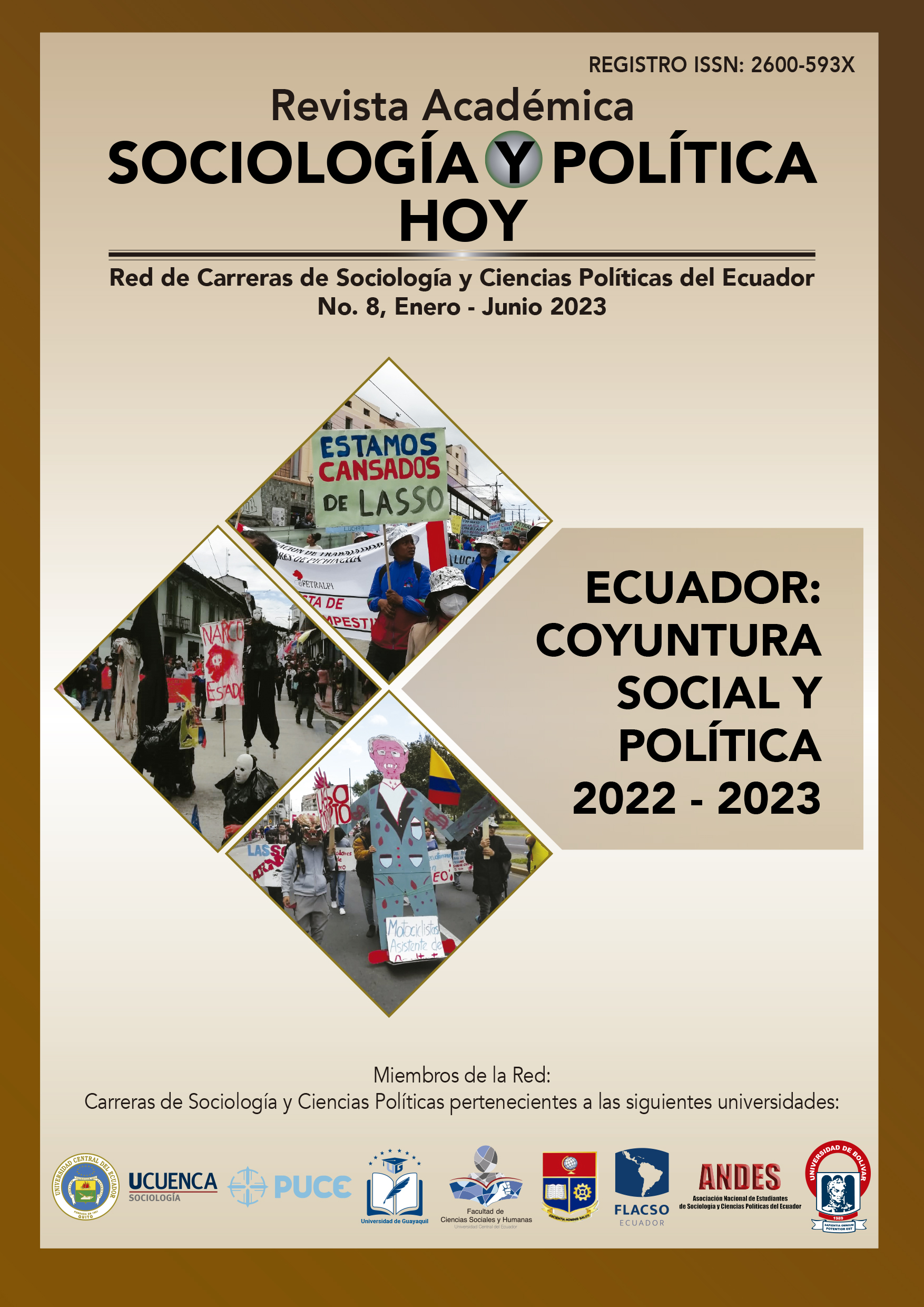Entre el Antagonismo y el Derecho:
Una reflexión sobre el Paro Nacional de 2022
Keywords:
Law, state of exception, friend/enemy, government, national strikeAbstract
The application of the neoliberal model since 2017, as well as the implications of COVID-19, generated a context of economic, political, and social crisis in Ecuador. This situation caused several indigenous organizations to call a National Strike in June 2022 to demand the fulfillment of 10 points that would improve their living conditions. However, the implementation of a contentious policy by the indigenous sectors caused the government to apply measures to deal with the mobilizations. In this context, this article aims to reflect on the events of the National Strike through theoretical concepts. At first, it delves into the existing inaccuracies of the right to resistance. Secondly, it addresses the implications of the violence of the law and its double standards from the distinction between friend and foe on the part of the State. In a third moment, the implications of the application of the state of emergency during the mobilizations are analyzed. Finally, it reflects on the dialogue between government and indigenous sectors.
Metrics
References
Agamben, G. (2005). Estado de excepción. Homo sacer, II, I (F. Lebenglik, Ed.; F. Costa & I. Costa, Trads.). Adriana Hidalgo. http://bit.ly/3tTeoOS
Alianza por los Derechos Humanos Ecuador. (2022, agosto 31). Incidentes Derechos Humanos paro 2022. Monitoreo de vulneraciones a los Derechos Humanos en el Ecuador. http://bit.ly/3U6R22Y
Althusser, L. (2003). Ideología y aparatos ideológicos del Estado. En C. Beltrame, M. Podetti, P. Preve, M. Rosenberg, J. Sazbón, T. Segovia, & I. Vericat (Trads.), Ideología. Un mapa en cuestión. Fondo de Cultura Económica.
Anderson, P. (2018). Capítulo III: Asimetrías. En L. Bassols & J. R. Fraguas (Trads.), Las antinomias de Antonio Gramsci (Vol. 68, pp. 96-118). Ediciones Akal.
Benjamin, W. (2008). Tesis sobre la historia y otros fragmentos (B. Echeverría, Trad.). Itaca/UACM. http://bit.ly/3EmTPPO
Chérrez, C. (2012). Ecuador: Criminalización de la protesta social en tiempos de “revolución ciudadana. Revista Aportes Andinos (AA), 30. http://bit.ly/3EUyLlb
Esposito, R. (2005). Immunitas: Protección y negación de la vida. Amorrortu. http://bit.ly/3F2uRqn
Estévez, E., & Adatti, N. (2020). Criminalización del ciclo de protestas suscitadas en el Ecuador en octubre de 2019 por parte del Estado. [PhD Thesis, Quito: Universidad de Los Hemisferios 2020]. http://bit.ly/3Or9rq8
Fernando Cerón [@FRCERON]. (2022). La última vez que la Casa de la Cutura fue allana fue en dictadura, hace 46 años. [Tweet]. Twitter. https://t.co/8bvAkP5F5v
Filgueira, F., Galindo, L. M., Giambruno, C., & Blofield, M. (2020). América Latina ante la crisis del COVID-19: Vulnerabilidad socioeconómica y respuesta social. http://bit.ly/3IPyG4i
Frieiro, L., & Sánchez, B. (2021). Ecuador: El neoliberalismo por sorpresa. Revista Argentina de Ciencia Política, 1(26), 125-164.
Jakobs, G. (2003). Derecho Penal del enemigo (M. Cancio, Trad.). Civitas. http://bit.ly/3gHL2A9
Ortega, F. M., & Cruz, A. J. A. (2021). Análisis de las campañas políticas de Andrés Arauz y Guillermo Lasso durante el balotaje del 2021 en Ecuador: Contexto electoral, ejes discursivos, relatos políticos, targets y diversificación. Revista Enfoques de la Comunicación, 97-138.
Presidencia de la República del Ecuador. (2022a, junio 13). Evaluación de la jornada de movilizaciones en el país—Instalación de Puesto de Mando Unificado [Interview]. https://www.youtube.com/watch?v=JTslPOQTuXE
Presidencia de la República del Ecuador. (2022b, junio 24). Cadena Nacional-16 de junio de 2022 [Interview]. https://www.youtube.com/watch?v=ioMbcUosmAQ
Salazar Marín, D. (2010). El derecho a la protesta social en Ecuador. La criminalización de los manifestantes persiste pese a las amnistías. ¿Es legítima la criminalización de la protesta social? Derecho Penal y libertad de expresión en América Latina, 101-144.
Samir, F. (2006). Excepción, decisión y derecho en Carl Schmitt. Argumentos (México, DF), 19(52), 125-145.
Schmitt, C. (2009a). La tiranía de los valores (S. Abad, Trad.). Hydra.
Schmitt, C. (2009b). Teología política (F. Conde & J. Navarro, Trads.). Editorial Trotta, S.A. http://bit.ly/3uczCY4
Secretaría Nacional de Planificación. (2021). Plan de Creacion de Oportunidades 2021-2025. Plan Nacional de Desarrollo, 120.
Tarrow, S. (1996). Social Movements in Contentious Politics: A Review Article. American Political Science Review, 90(4), 874-883. https://doi.org/10.2307/2945851
Žižek, S. (2009). Sobre la violencia (A. Antón, Trad.). Paidós. http://bit.ly/3F3jPkT
Plexo Normativo
CIDG. (2019). Protesta y derechos humanos. Inter-American Commission on Human Rights. Office of the Special Rapporteur for Freedom of Expression. Protest and human rights. (OAS. Official records.
Código de conducta para funcionarios encargados de hacer cumplir la ley, Resolución 34/169 (1979). http://bit.ly/3XsXzI5
Código Orgánico Integral Penal, Registro Oficial No 180 (2014). http://bit.ly/3Ot6dSO
Constitución de la República del Ecuador, Registro Oficial No. 449 (2008). http://bit.ly/3VhDL8P
Decreto Ejecutivo No 455, N.o 455 (14 de junio de 2022). http://bit.ly/3XJaHZV
Decreto Ejecutivo No 459, N.o 459 (20 de junio de 2022). http://bit.ly/3ueJBwg
Downloads
Published
How to Cite
Issue
Section
License

This work is licensed under a Creative Commons Attribution-NonCommercial 4.0 International License.
Esta obra está bajo una licencia internacional Creative Commons Atribución-NoComercial 4.0.









